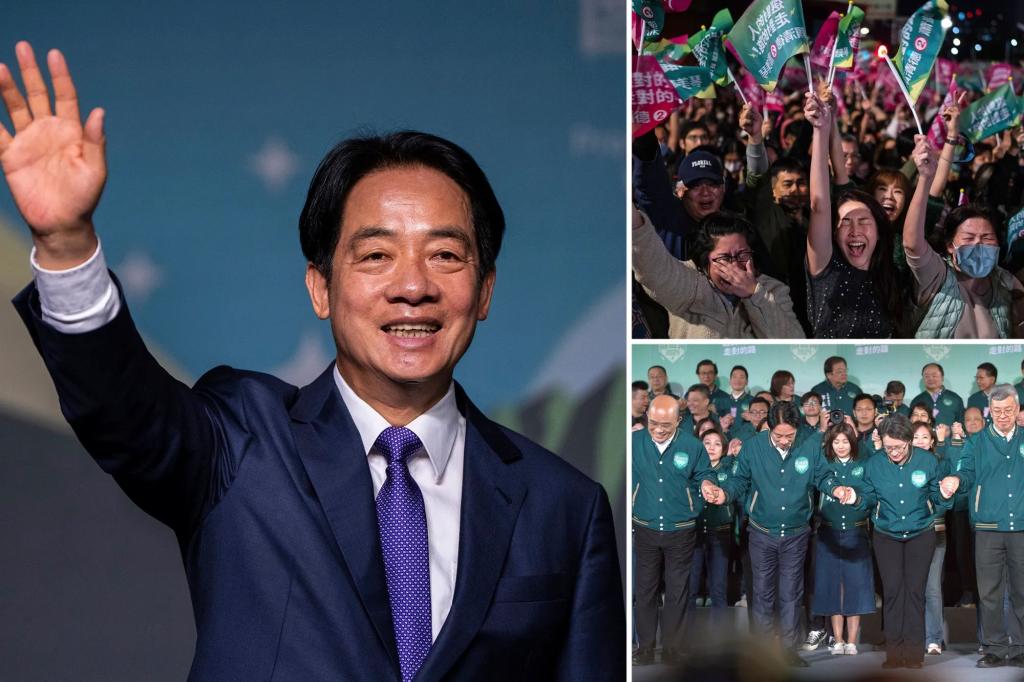Voters in Taiwan defied a strong pressure campaign by China and elected Beijing’s least favored candidate as president on Saturday, in a victory that is likely to fuel further tensions between the island’s democracy and its communist neighbor.
Acting Vice President Lai Ching-te, whom Beijing has called a “troublemaker,” claimed presidential victory with 40% of the vote in a three-way race.
China, which claims Taiwan as its own, had favored the Kuomintang’s Hou Yu-ih, who came in second with 33% of the vote. Hou had promised to restart diplomatic talks with the CCP.
The upstart Taiwan People’s Party, led by Ko Wen-je, won 26% of the vote and came in third place.
“The Taiwanese people have successfully resisted the efforts of external forces to influence these elections,” Lai rejoiced in his acceptance speech.
The result gave the ruling Democratic Progressive Party its third consecutive term in office.
“We have shown the world how much we appreciate our democracy,” Lai said. “This is our unwavering commitment.”
Vice President Lai Ching-te’s victory will likely stir tensions between Taiwan and China. AP
The CCP has long denounced Lai and his term-limited DPP partner, current President Tsai Ing-wen, as “separatists” for rejecting China’s sovereignty claims over Taiwan and its stated goal of reunification.
Chen Binhua, a spokesman for China’s Taiwan Affairs Office, said the results would not alter China’s policies.
“Our stance on resolving the Taiwan question and achieving national reunification remains consistent, and our determination is as firm as a rock,” Binhua said, according to state news agency Xinhua.
The Taiwanese people voted to re-elect the Democratic Progressive Party for a third consecutive term. AP
The United States’ long-standing “one China” policy recognizes Beijing as the legitimate government of China itself, without acceding to its claims to also govern Taiwan. The United States has continued an “unofficial relationship” with Taiwan without formally recognizing it as an independent nation.
President Biden said on Saturday that U.S. policy toward Taiwan would also not change.
“We do not support independence,” Biden told reporters as he left the White House for a weekend at Camp David.
Secretary of State Antony Blinken congratulated Lai in an official statement.
China has opposed Lai and his term-limited DPP partner, current President Tsai Ing-wen. AP
“The United States is committed to maintaining cross-Strait peace and stability and to the peaceful resolution of differences, free of coercion and pressure,” Blinken said. “We look forward to working with Dr. Lai and Taiwan’s all-party leaders to promote our shared interests and values, and advance our long-standing unofficial relationship, consistent with the US one-China policy.”
Meanwhile, Russia expressed support for China’s reunification plans, two weeks after Xi Jinping vowed to end Taiwan independence in a New Year’s speech.
Moscow “continues to view Taiwan as an integral part of China,” a Russian Foreign Ministry spokesperson said on Saturday.
“The expectation is that Beijing will be tough on Lai,” Yun Sun, a China foreign policy expert at the Stimson Center think tank, told the Wall Street Journal, with expanded military exercises in Taiwan’s waters, drone flights over its territory and economic measures. probable sanctions in sight.
Categories: Trending
Source: vtt.edu.vn
